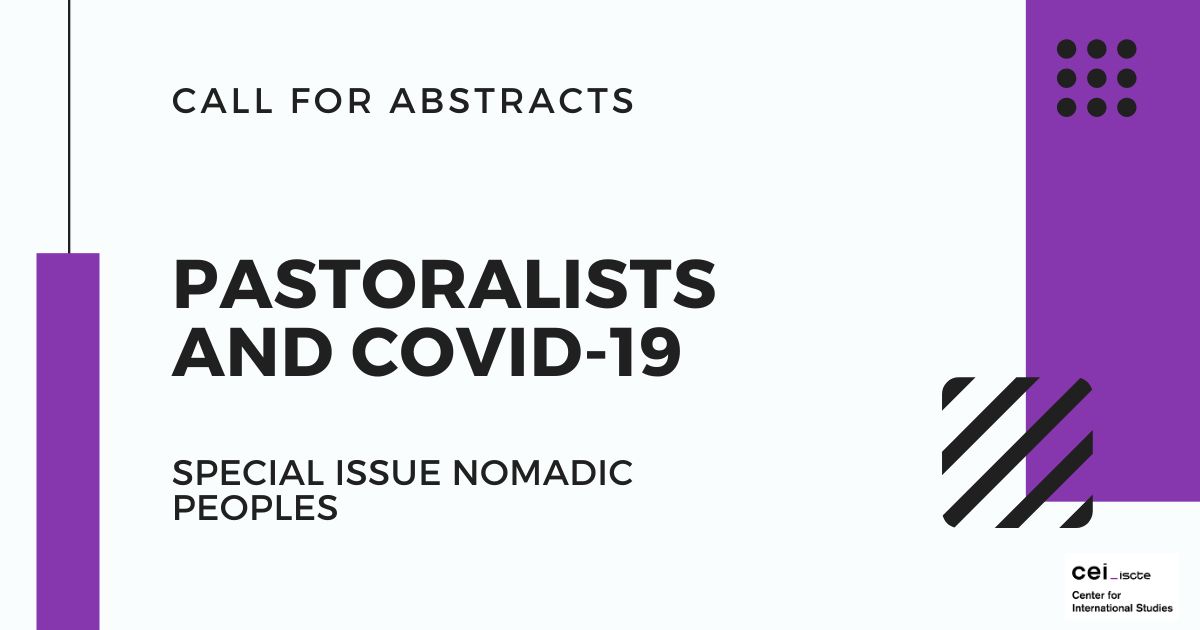
Special Issue Nomadic Peoples
During the Covid-19 pandemic, governments introduced measures to limit mobility and curb social contact as a way to contain the spread of the coronavirus. Harsh Covid-19 measures were implemented in countries with, among others, pastoral and agro-pastoral populations. Restrictions were often more disruptive than the disease itself. Dryland pastoralists are well known for living off uncertainty (Krätli and Schareika 2010; Scoones 2020) and bouncing back from disasters, including epidemics and epizootics (Waller 1988; Tiki and Oba 2009).1 Key to this resilience has been the mobility, flexibility and reciprocity of pastoral life and livelihoods (Fernandez-Gimenez and Le Febre 2006; van Dijk et al. 2022), although these strategies have been under increasing stress from developments common in dryland areas such as marginalization, political instability, land grabs and increasing climatic volatility (Kronenburg García et al. 2022). So, what happens when on top of these challenges a global disaster strikes and governments order people to ‘stay at home’ and be ‘socially distant’?
This special issue explores how pastoralists experienced, understood and dealt with the Covid-19 pandemic and its restrictions. What were the impacts of these restrictions, and how did pastoralists respond to them? What are narratives and interpretations regarding the disease and/or associated restrictions? Were there any surprises and unexpected positives and outcomes? What happened when restrictions were lifted? Have there been lasting and structural changes following the Covid-19 pandemic and its containment measures? We contribute to the emerging literature on Covid-19 and pastoralism (Griffith et al. 2020, 2021; Simula et al. 2021; Roque de Pinho et al. 2022) and invite contributions that explore specific topics in depth, such as impacts of border closures on grazing, transhumance and trade, experiences of young pastoralist women, and education. Our view of pastoralists is broad, including, but not limited to, (semi)nomadic pastoralists, agro-pastoralists and urban pastoralists.
The Covid-19 pandemic also changed the nature of doing research, similarly to how insecurity in places like the Sahel led to reconfigurations in doing fieldwork. Faced with travel restrictions that prevented researchers from doing fieldwork, many embraced the ‘methodological mess’ advocated for fieldwork in high uncertainty contexts (Pappagallo and Semplici 2020) and turned to remote (Hermans et al. 2021) and/or more collaborative forms of research by engaging (non-academic) friends and former research assistants as co-producers of knowledge and researchers in their own terms (co-researchers).2 . We welcome contributions that reflect on such collaborative experiments and/or that are (co-)authored by pastoralist co-researchers. The word count for each paper will be between 5000-6000 words including references and footnotes.
This call for abstracts is for a Special Issue in the international, peer-reviewed journal Nomadic Peoples. If you are interested in contributing, please send the guest editors an abstract of 250 words by June 1st, 2023. Authors will be notified about a decision in July 2023, and the deadline for paper submission is on January 1st, 2024.
Guest editors: Angela Kronenburg García, University of Padua/UCLouvain angela.kronenburg@unipd.it; Joana Roque de Pinho, Instituto Universitário de Lisboa roquedepinho.joana@gmail.com; Annemiek Pas, Wageningen University/University of Gothenburg annemiekpasschrijver@gmail.com
References
Dijk, H. van, C. Samimi & H. Zandler (2022) Climate variability and institutional flexibility: Resource governance at the intersection between ecological instability and mobility in drylands. In: A. Kronenburg García, T. Haller, H. van Dijk, C. Samimi & J. Warner (eds.), Drylands Facing Change: Interventions, Investments and Identities, pp. 15-31. Abingdon: Routledge.
Fernandez-Gimenez, M.E. & S. Le Febre (2006) Mobility in pastoral systems: Dynamic flux or downward trend? International Journal of Sustainable Development & World Ecology 13: 341-362.
Griffith, E.F., Craige, S., Manzano, P., Pius, L. and Jost, C.C. (2021) Impacts of the COVID-19 pandemic on food security among East and West African pastoralists. In: M.J. Cohen (ed.), Advances in Food Security and Sustainability (Vol. 6), pp. 231-261. Elsevier.
Griffith, E.F., Pius, L., Manzano, P. and Jost, C.C. (2020) COVID-19 in pastoral contexts in the greater Horn of Africa: Implications and recommendations. Pastoralism 10(1): 1-12.
Hermans, K. et al. (2021). Crisis-induced disruptions in place-based social-ecological research – An opportunity for redirection. GAIA – Ecological Perspectives for Science and Society 30(2): 72–76.
Krätli, S. and Schareika, N. (2010) Living off uncertainty: The intelligent animal production of dryland pastoralists. European Journal of Development Research 22(5): 605–622.
Kronenburg García, A., T. Haller, H. van Dijk, C. Samimi, J. Warner (eds.) (2022) Drylands Facing Change: Interventions, Investments and Identities. Abingdon: Routledge.
Pappagallo, L. and Semplici, G. Editorial introduction. Methodological mess: Doing research in contexts of high variability. Nomadic Peoples 24(2): 179-194.
Roque de Pinho, J., A. Kronenburg García, N. Hashimshony-Yaffe, T. Sternberg, A. Pase, S. ole Neboo, D. Seenoi, D. Mayiani, L. ole Mowuo, M. ole Mowuo, S. Wario, B. Batjav, B. Battsengel, E. Sainbayar (2022) Pastoralists under Covid-19 lockdown: Collaborative research on impacts and responses in Kenyan and Mongolian drylands. In: A. Kronenburg García, T. Haller, H. van Dijk, C. Samimi, J. Warner (eds.), Drylands Facing Change: Interventions, Investments and Identities, pp: 215-235. Abingdon: Routledge.
Scoones, I. (2020) Pastoralists and peasants: Perspectives on agrarian change. The Journal of Peasant Studies 48(1): 1-47.
Simula, G. et al. (2021) COVID-19 and pastoralism: Reflections from three continents. The Journal of Peasant Studies 48(1): 48–72.
Tiki, W. and Oba, G. (2009) Ciinna – The Borana Oromo narration of the 1890s Great Rinderpest epizootic in North Eastern Africa. Journal of Eastern African Studies 3(3): 479–508.
Waller, R. (1988) Emutai: crisis and response in Maasailand 1883–1902. In: D.H. Johnson and D.M. Anderson (eds.), The Ecology of Survival: Case Studies from Northeast African History, pp. 72–112. London: Lester Crook Academic Publishing.
[1] See also the blogpost by Scoones and Nori (2020): https://pastres.org/2020/03/27/living-with-coronavirus-uncertainties-four-lessons-from-pastoralists/
[2] See for instance the ‘Covid-19 in African, Asian and North American drylands’ working group: https://converge.colorado.edu/working-groups/covid-19-in-african-asian-and-north-american-drylands/